How Williams fraternity brothers ‘adopted’ a family of refugees — and plan to reunite with them 66 years later
May 3, 2023
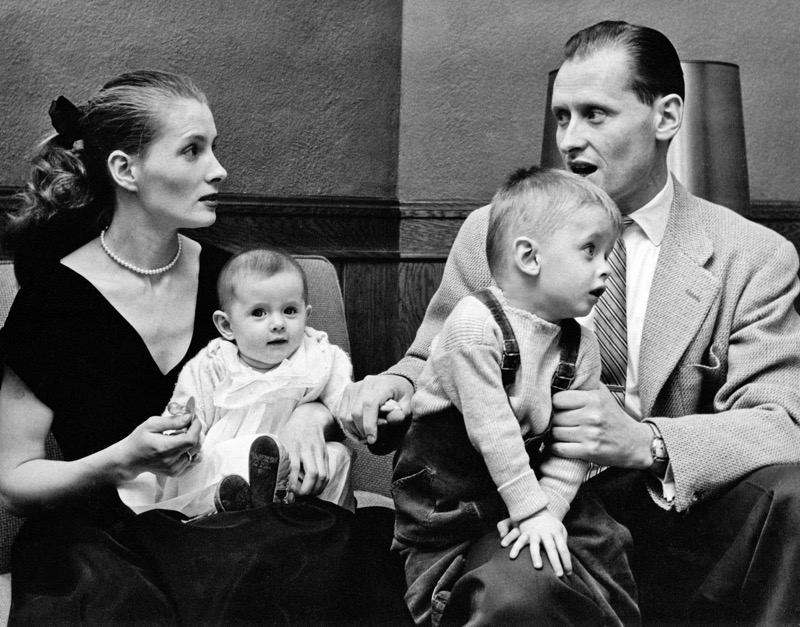
At the height of the Hungarian Revolution in November 1956, Steve Bullock ’57 pitched an idea to his Delta Upsilon (DU) fraternity brothers: to “adopt” a family of Hungarian refugees. Three months and a series of miracles later, a Hungarian family of four moved into the DU fraternity house in Williamstown.
Fraternity brothers spurred into action
Bullock conceived of the adoption after he and his fraternity brothers watched a news broadcast about the Soviet Union’s brutal response to the Hungarian uprising, Bullock told the Record in an interview. “Everyone was stirred up about it,” he said. “It just seemed like a decent thing to do to give these people a place to live.”
According to a Jan. 12, 1957, Record article, each DU brother agreed to increase his monthly dues from $2 to $4 in order to support the incoming family. “We’d spend [a few hundred dollars] a month on one party for the girls,” Bullock said. “I thought we could do something for one family — something really worthwhile — not just partying and all that.”
Several other campus fraternities sought to help out in various ways as well. Zeta Psi organized a clothing drive for Hungarian refugees in Austria, the Record reported on Dec. 12, 1956. Similar to DU, Phi Delta Theta offered to cover room and board for a Hungarian student to enroll at the College, and later the College agreed to pay the student’s tuition, the Record reported on Feb. 6, 1957. That same February, Phi Delta Theta welcomed 25-year-old Gabor Teleki ’61, a Hungarian immigrant who enrolled at the College and earned a degree in physics.
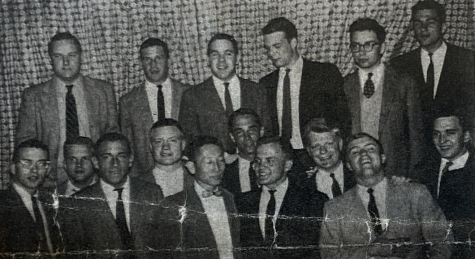
“Fraternities have a reputation … but every now and then something bright happened,” Bullock said. “I don’t think we meant for this to be a great thing for the fraternity, it just seemed like something the people ought to do.”
Meet the Csanádi family
A February 1957 article in The Cornerstone, DU’s newsletter, described the difficulties of actually finding a Hungarian family to host. Bullock and his fraternity brothers wrote letters to Camp Kilmer, a processing center in New Jersey that received thousands of Hungarian refugees fleeing the Soviet invasion, but they received no response.
Then-President of the College James Phinney Baxter III, Class of 1914, even attempted to call the placement bureau on the fraternity’s behalf, but he was unsuccessful. Ultimately, two members of the fraternity — Bob Ause ’57 and John Mangel ’59 — drove down to Camp Kilmer themselves on Feb. 3, 1957.
When Ause and Mangel arrived at Camp Kilmer, Bullock said, they had only a Hungarian-English dictionary to communicate. With the help of an interpreter, a dispatcher eventually found the students a family of four to “adopt.”
The family — father Oswald Csanádi, mother Mária, two-year-old son Oswald Jr., and five-month-old daughter Beata — had fled Hungary earlier that year. Oswald spoke a small amount of English and fluent German, but the rest of the family spoke only Hungarian.
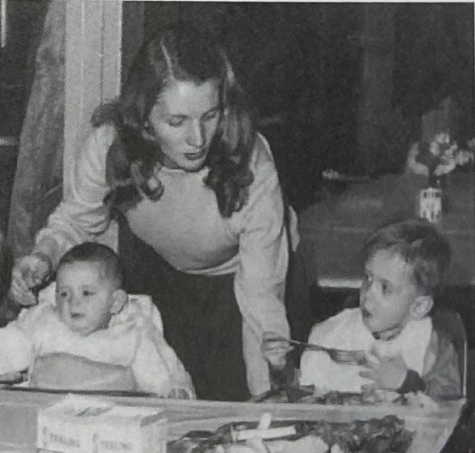
In her 2009 memoir, Precious Legacy, Mária recalled the drive from New Jersey to the College. “I remember stopping on our way to Williamstown to eat at a Howard Johnson,” she wrote. “Everything was a new experience for me: riding in a beautiful private car on the American freeway, stopping to eat in a restaurant, listening to the conversation between the young men… I didn’t understand a word they were speaking!”
Later that night, the family arrived at the DU house, and the reality of “adopting” a family set in. “All the fraternity boys just had dinner, and Mária was changing the kids’ pants on our sofa,” Bullock said. “We gasped, ‘My God, it’s a diaper!’”
Perhaps the brothers hadn’t fully considered the impact of combining family life with a fraternity house, Bullock said. “We were really ready for this — you can tell we were well equipped to take care of a family,” he recalled sarcastically.
A Town-wide effort
Bullock rallied people across the College and Town to support the Csanádi family. The family’s living expenses were covered by DU and St. John’s Episcopal Church, and they received clothing and furniture donations from Town residents, Bullock said. They received additional support from the Williamstown National Bank, whose president offered the family a temporary stay in his home. Community members helped find a job for Oswald at Sprague Electric in North Adams.
DU planned to support the family for one year until the Csanádis became self-sufficient. After arriving to campus, the Csanádis lived in an apartment in the back of the DU house — which stood where Garfield House stands today — for about a month before moving into a house on Cole Avenue, where they then lived for three years.
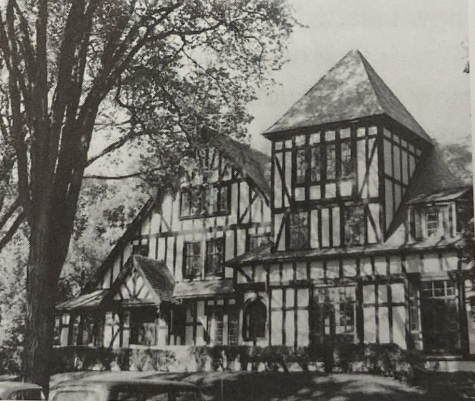
Even though the Csanádis eventually moved away from the DU house, the fraternity brothers stayed involved in their transition to life in Williamstown. Mária invited them to her home for a lunch of Hungarian goulash each Thursday, various brothers helped transport the family members around town, and Oswald mowed the DU house’s lawn, Bullock remembered.
The Csanádis gradually found ways to overcome the language barrier through local translators, Bullock said. The owner of the Northside Motel at the time spoke Hungarian, and the Hungarian photojournalist Lucien Aigner — a Great Barrington resident who became famous for his photos of Albert Einstein — helped get the family settled. One fraternity member, George Erlanger ’59, was able to speak German with Oswald, too.
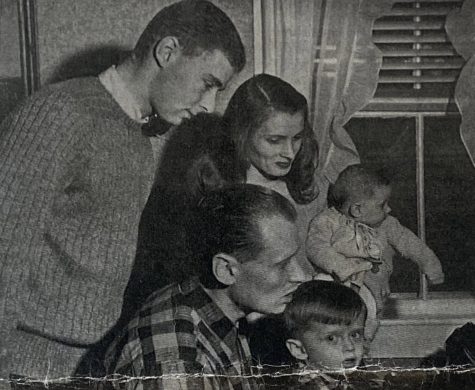
Bullock faced some criticism for the move to host the family. After he was credited with the idea in several newspaper articles, he said, a woman from North Adams wrote him a letter asking why they focused their money on supporting Hungarian refugees rather than combating poverty in local areas. But the majority of the people supporting the family were thrilled to be involved, Bullock said.
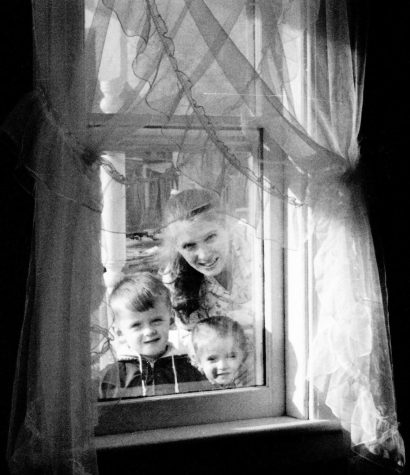
Lost contact and a discovery
Three years later, the Csanádis moved to California and lost contact with the fraternity for over five decades. But 66 years after the family set foot in Williamstown, the miraculous saga resumed.
Bullock and his longtime friend Gay Klaus Scarborough were going through files that were stored in his basement when they discovered old letters and issues of The Cornerstone, which the fraternity’s secretary — Bradley Thayer ’58 — would use to update DU members’ parents on the goings-on in the house. One of these letters mentioned the Csanádi family’s stay in Williamstown.
“Our relationship with the Hungarian family has been very rewarding,” Thayer wrote in the May 1957 letter. “By developing personal contacts during our regular Thursday guest meals, taking them to the movies and to college concerts, and introducing them to the community, the Brothers and Mr. and Mrs. Csanádi have become fast friends.”
Scarborough decided to look for the Csanádis online, she told the Record. After some research, she found out that Oswald and Mária had passed away, but that Oswald Jr. and Beata are still alive and currently reside in San Diego, Calif. She hoped to contact the Csanádi children, calling several numbers and waiting for the right one.
Reconnecting
On Feb. 17, 2023, Beata Csanádi’s phone rang. “Noting that the caller ID displayed Williamstown … the thought crossed my mind, ‘Huh, that’s where we lived when we first settled in America,’” Beata wrote in an email to the Record. “I ignored it anyway, assuming it was spam.”
Initially unable to reach Beata, Scarborough left a voicemail. “Mere seconds into her message, the hairs on the back of my neck stood up and my heart started pounding,” Beata wrote.
“Of course, I immediately called her back!” Beata wrote. “From the moment I listened to that voicemail, and all through the subsequent long phone call, I found it impossible to contain my tears.”
In their conversation, Beata explained to Scarborough that her mother had written a memoir called Precious Legacy about the family’s experience narrowly skirting death while fleeing Hungary and ultimately living in Williamstown. Bullock and Scarborough read the book and agreed that the circumstances that brought the Csanádi family to town in the 1950s — and led to their reconnection this year — were astonishing.
The near-misses continued throughout Bullock and Scarborough’s rediscovery of the Csanádi family. “If it hadn’t been for [Scarborough], I wouldn’t have done any of this, because I could have lost the documents or not followed up with them,” Bullock said. “This whole story is a series of falling through the cracks and making it… This conversation would not exist had it not been for sheer dumb luck.”
“Gratitude seems like an inadequate word,” Beata wrote. “[This has] made me realize just how lucky our family was.”
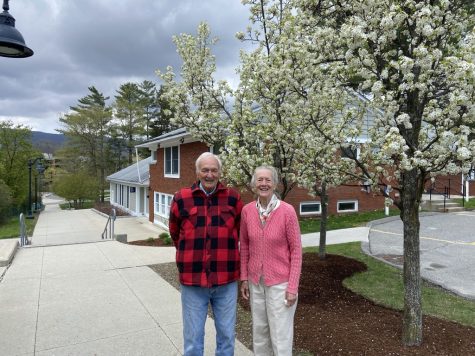
To reunite 66 years later: ‘A wonderful grand finale’
Oswald Jr. and Beata Csanádi plan to return to Williamstown this June to attend the 65th reunion for the Class of 1958.
“I’m absolutely thrilled at being reconnected with our DU sponsors, and am very much looking forward to meeting them next month,” Beata wrote. “I’d also love to track down any surviving community members who helped us as well.”
Scarborough and Bullock are equally excited for the reunion. “We’re trying to get some of the classmates to come, or if they can’t come, to write letters for [the Csanádis] to put in a book,” Scarborough said. “It’s just a miracle that everything has come together.”
Beata is grateful to have restored her connection with the College. “I honestly don’t know if my parents ever tried to reconnect; they were always so busy working, raising us kids,” Beata wrote. “Connections were of course more difficult to rekindle before the internet… I believe the desire, however, was always there. I’m just grateful Steve decided to look through his old newspaper clippings and took the initiative.”
“It’s just marvelous, and it completes the circle,” Scarborough said. “It is a wonderful grand finale.”








